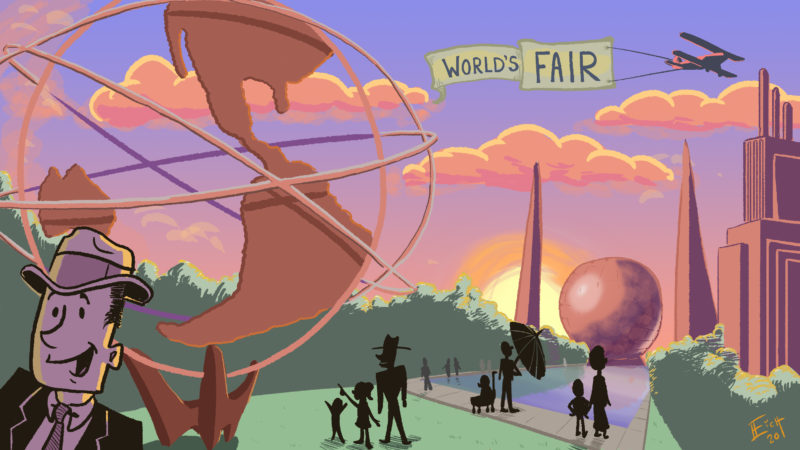At the turn of the 20th century and well past the middle of the century, there was a very strong sense of optimism about the future. And it was not without warrant. If you were born in the 1890s and lived to be 80 years old, you saw the creation of the airplane, the implementation of vehicles into everyday life, men walking on the moon, and radical changes in technology inside of the home – ranging from indoor plumbing and running water to air conditioning. From the 1890s to the 1970s, the technological advancements that world civilization made were unlike anything in the history of this planet.
At the heart of all the advances that were made was the desire to continuously push the envelope and alter the way that people lived their lives and interacted with the man-made world around them.
Enter the World’s Fairs
The World’s Fairs were forums for inventors, creators, corporations, and the brilliantly minded who had eyes towards the future to gather and share their creations and visions with the world.
According to Insider.com, here are just some of the inventions that debuted at a World’s Fair:
- Color television
- Touchscreens
- The telephone
- Ice cream
- Landmarks like the Space Needle and the Eiffel Tower
- The Ferris Wheel
- The dishwasher
- X-rays
- Broadcast television
With this said, what happened to the World’s Fair? The last one in the U.S. was held in New Orleans in 1984. They have continued to be held internationally, generally known as World Expo, but their importance has been greatly reduced. Sure, people attend them (this year notwithstanding), but their allure and mystique has all but evaporated, at least in the eyes of Americans. Why is that?
A primary reason that Americans might not be as interested in attending a World’s Fair is that in recent decades technological advancements have primarily sought only to simplify our lives, with less of an emphasis on actual innovation. Additionally, Americans have less of an eye towards the future than ever before (at least the long-term future).
Technology, it would appear, has hit something of its peak in terms of innovation. Will there be hundreds of thousands of new inventions and new ways of doing things between now and the year 2100? The answer is likely yes, but technology since the start of the 21st century has moved in two directions: keeping us entertained and making our lives easier.
When it comes to entertainment, technology’s impact on our lives couldn’t be any more obvious. Consider this: back in 1995, most people didn’t have computers in their homes that were hooked up to the internet, and for the people who did, internet speeds were incredibly slow. And if one did surf the web, there wasn’t a lot to do. In 2020, people walk around with computers in their pockets that allow them to instantly message their friends, families, and coworkers, and to read and watch literally thousands and thousands of hours worth of content (mostly for free). Nearly all Americans watch a video, play a game, read an article, go onto a social media platform, or do some other form of recreation on their smart devices every single day. In addition to cell phones’ invasion into all aspects of our lives, we have also seen the rise of streaming services that contain hundreds of times the amount of content that Blockbusters and other video rental stores could ever dream of carrying.
In the last 30 years, there haven’t been many new things created that chart new territory. Rather, new technology that gets produced primarily aims to improve upon what already exists. In a light interpretation of McLuhan’s Tetrad, most smart devices, which have seen the most profound advancements since the 1990s, aim at just blending computer-based technologies with already existing appliances. For example, a phone plus a computer results in a smartphone; a TV plus a computer results in a smart TV that’s capable of internet functionality (access to Netflix and other streaming services, for example), and so on. These incremental changes to technology don’t attract people’s attention in the same way that groundbreaking tech did in the past.
There’s also the fact that as a society we’re incredibly skeptical that our collective future is going to be bright. It’s not that everyone walks with their heads down, but rather, there isn’t a prevailing belief in the Western World that the future is going to be as great or as glorious as the past was. There’s also the issue that there isn’t a sense of something to conquer or a strong desire for society to accomplish anything worthwhile or grand. Flight has been conquered, sanitation practices are widely accepted in America, man has walked on the moon, and most people are entertained to such an extent that they don’t even consider how advances in the fields of technology can alter the physical world around them. Prominent people and politicians rarely mention technological innovation, as they’re more concerned with issues like eliminating poverty, world peace, and even a concept that has little to no political persuasion impacting it – a person walking on Mars.
Is it possible that Americans can view the future with optimism again? Is it possible that corporations’ hold on society will diminish enough that real advances in technology can be made? Is it possible that leaders with visions can get into elected office? Yes, it’s possible, but it remains to be seen if it shall come to pass.





